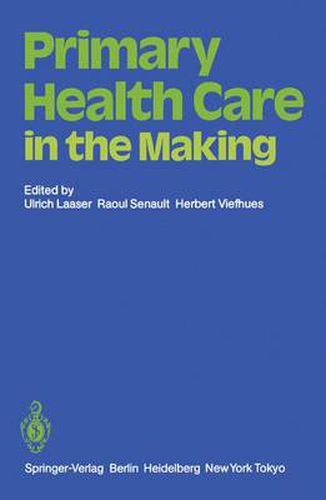Readings Newsletter
Become a Readings Member to make your shopping experience even easier.
Sign in or sign up for free!
You’re not far away from qualifying for FREE standard shipping within Australia
You’ve qualified for FREE standard shipping within Australia
The cart is loading…






This title is printed to order. This book may have been self-published. If so, we cannot guarantee the quality of the content. In the main most books will have gone through the editing process however some may not. We therefore suggest that you be aware of this before ordering this book. If in doubt check either the author or publisher’s details as we are unable to accept any returns unless they are faulty. Please contact us if you have any questions.
Since the historieal conference held in Alma Ata in 1978, it has been possible to observe a reorientation of the medical profession. More and more, issues of health enter the stage and curative medicine is not just loosing ground but some interest. ‘How effective is health education?’ and ‘Whose task is primary pre vention?’ are questions which stimulate great concern and public debate. It seems also to be the first time since the last decades of the 19th century that the social dimension of health receives adequate consideration. Thus the reeent publication of the so-called Black Report on Inequalities in Health (Penguin 1982) led to a heated discussion in Great Britain, certainly of relevance to many other countries. The 6 years since 1978 are much too short a time to proceed far towards ‘Health for All’, as the slogan of the World Health Organization puts it, but the concepts are spelled out, vaguely but convincing to many of us. It is the right time to discuss first experiences and to move from philosophy to empiri eal work. This work - as it relates to the process evolving since Alma Ata - is characterized by participation, cooperation and prevention: Participation, because ‘disease’ concerns only the individual patient, his or her family and immediate social environment, while ‘health’ concerns everyone and should involve everyone. It is a task of the whole of society rather than the domaine of a single profession or party.
$9.00 standard shipping within Australia
FREE standard shipping within Australia for orders over $100.00
Express & International shipping calculated at checkout
This title is printed to order. This book may have been self-published. If so, we cannot guarantee the quality of the content. In the main most books will have gone through the editing process however some may not. We therefore suggest that you be aware of this before ordering this book. If in doubt check either the author or publisher’s details as we are unable to accept any returns unless they are faulty. Please contact us if you have any questions.
Since the historieal conference held in Alma Ata in 1978, it has been possible to observe a reorientation of the medical profession. More and more, issues of health enter the stage and curative medicine is not just loosing ground but some interest. ‘How effective is health education?’ and ‘Whose task is primary pre vention?’ are questions which stimulate great concern and public debate. It seems also to be the first time since the last decades of the 19th century that the social dimension of health receives adequate consideration. Thus the reeent publication of the so-called Black Report on Inequalities in Health (Penguin 1982) led to a heated discussion in Great Britain, certainly of relevance to many other countries. The 6 years since 1978 are much too short a time to proceed far towards ‘Health for All’, as the slogan of the World Health Organization puts it, but the concepts are spelled out, vaguely but convincing to many of us. It is the right time to discuss first experiences and to move from philosophy to empiri eal work. This work - as it relates to the process evolving since Alma Ata - is characterized by participation, cooperation and prevention: Participation, because ‘disease’ concerns only the individual patient, his or her family and immediate social environment, while ‘health’ concerns everyone and should involve everyone. It is a task of the whole of society rather than the domaine of a single profession or party.